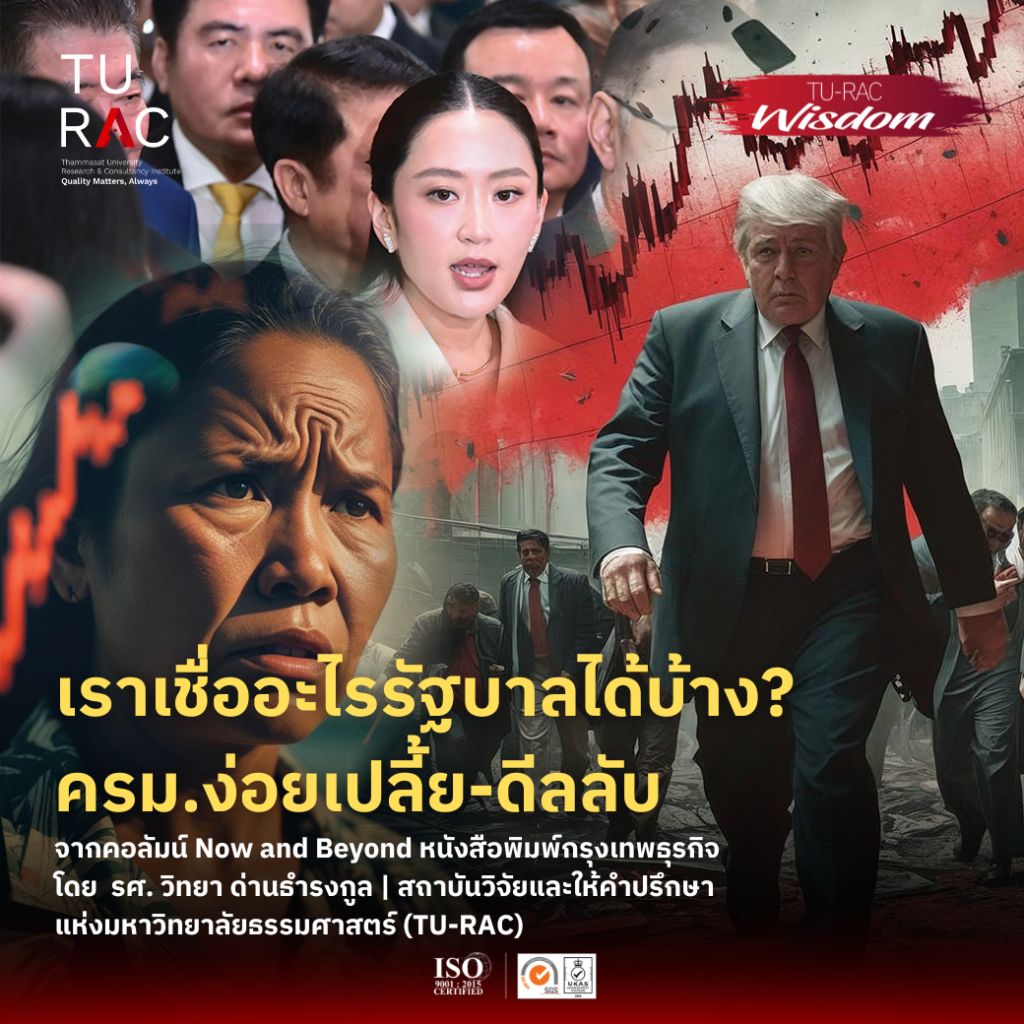TU-RAC ชวนอ่านบทความจากกรุงเทพธุรกิจ ในคอลัมน์ Now and Beyond by TU-RAC ทุกวันพฤหัสบดี ในหนังสือพิมพ์กรุงเทพธุรกิจ และกรุงเทพธุรกิจออนไลน์ เรื่อง เราเชื่ออะไรรัฐบาลได้บ้าง? ครม.ง่อยเปลี้ย-ดีลลับ โดย รศ.วิทยา ด่านธำรงกูล สถาบันวิจัยและให้คำปรึกษาแห่งมหาวิทยาลัยธรรมศาสตร์ (TU-RAC) สะท้อนภาพรัฐบาลไทยในปัจจุบันที่กำลังเผชิญวิกฤตศรัทธาอย่างรุนแรง ทั้งในด้านการบริหาร การสื่อสาร และความโปร่งใส โดยชี้ให้เห็นถึงปัญหาหลักคือ คณะรัฐมนตรีที่ขาดความสามารถและความเข้าใจเชิงนโยบายอย่างแท้จริง โดยเฉพาะกรณี “ดีลลับ” กับสหรัฐฯ ที่ไม่มีข้อมูลชัดเจนใดเผยแพร่สู่สาธารณะ ขณะเดียวกัน ปัญหาคอร์รัปชันในภาครัฐยังคงเกิดขึ้นอย่างต่อเนื่อง ตั้งแต่การรีดไถนักท่องเที่ยว ไปจนถึงการเอื้อผลประโยชน์ต่อกลุ่มทุนโดยไม่มีการตรวจสอบ นโยบายกระตุ้นเศรษฐกิจอย่าง “ดิจิทัลวอลเล็ต” และ “OFOS” ก็ถูกตั้งข้อสงสัยว่าไม่มีทิศทางที่ชัดเจน และอาจเป็นเพียงเครื่องมือหาเสียงมากกว่าการสร้างผลประโยชน์ที่ยั่งยืนต่อประชาชน ส่วนการเดินทางต่างประเทศของนายกรัฐมนตรีเพื่อโปรโมต “ซอฟต์พาวเวอร์” ก็ถูกตั้งคำถามถึงความคุ้มค่าและเป้าหมายที่แท้จริง
อ่านต้นฉบับได้ที่: https://www.bangkokbiznews.com/politics/1183256
Can We Still Trust the Government?
.
TU-RAC invites you to read the latest article from Krungthep Turakij in the “Now and Beyond by TU-RAC” column, published every Thursday in both the print and online editions of the newspaper. This week’s article, “What Can We Still Trust About the Government? Ineffective Cabinet and Secret Deals”, is written by Associate Professor Witaya Danthamrongkul of Thammasat University Research and Consultancy Institute (TU-RAC).
The article paints a sobering picture of Thailand’s current government, which is facing a deep crisis of public trust—spanning its administration, communication, and transparency. At the core of the issue is a Cabinet that appears to lack both capability and genuine policy insight. One of the most concerning matters is the so-called “secret deal” with the United States, for which no clear information has been made public.
Meanwhile, corruption in the public sector continues unabated—from extortion of tourists to unchecked favoritism toward large business groups. Economic stimulus initiatives like the “Digital Wallet” and “OFOS” projects are also under scrutiny for being vague and potentially more about political campaigning than delivering sustainable benefits to citizens. Moreover, the Prime Minister’s international trips to promote “soft power” have raised questions about cost-effectiveness and actual objectives.
Read the full article here: https://www.bangkokbiznews.com/politics/1183256



